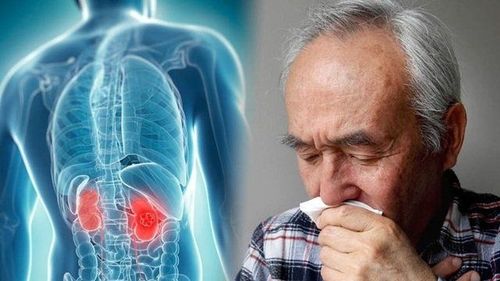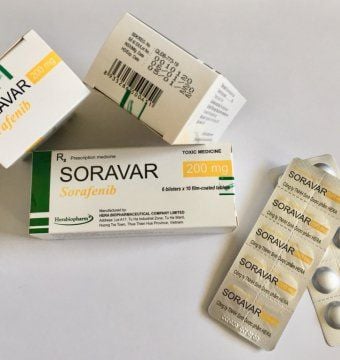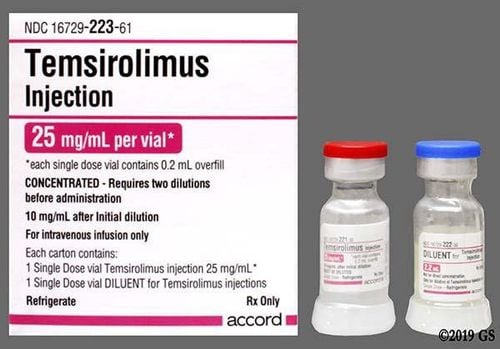This is an automatically translated article.
Kidney cancer is one of the 10 most common cancers, affecting many men. When the symptoms of the disease are obvious, then the cancer is already in the final stage. Therefore, accurate identification of risk factors for the disease is extremely important in the process of early diagnosis as well as effective treatment.
1. Kidney cancer
Kidney cancer starts in the kidney. The kidneys are organs located behind the abdominal organs with each kidney on either side of the spine.
In adults, renal cell carcinoma is the most common type of kidney cancer with about 90% of cancerous tumors. However, uncommon types of kidney cancer can still occur. Children are more likely to develop a kidney cancer called Wilms tumor.
The rate of kidney cancer now seems to be increasing. One of the reasons for this increase is that advanced imaging techniques (such as computed tomography, etc.) have been developed and used, making it easier for doctors to find them. the causes of the disease as well as the picture of the progression of the disease. With this condition, many cases of cancer are found in the early stages, when the tumor is small and confined to the kidney. That, will be easy for the treatment process as well as bring the best treatment results.
To date, renal cell cancer is the most common form of kidney cancer, with no known cause, despite several risk factors. Doctors and experts believe that kidney cancer begins when kidney cells mutate in their DNA. These mutations cause cells to grow and divide rapidly and accumulate to form tumors and extend beyond the kidneys. Some cells can break off and spread (metastasize) to other parts of the body.
Certain types of kidney cancer:
Renal cell carcinoma Transitional cell carcinoma Wilms tumor Renal connective tissue cancer

Ung thư tế bào thận là dạng ung thư khá phổ biến
2. Risk factors for kidney cancer
Some risk factors are anything that can increase your chances of getting cancer including kidney cancer. Although, some risk factors commonly influence cancer development, most of them do not directly cause cancer. In addition, in some special cases, people with risk factors for cancer never develop cancer.
Kidney cancer risk factors include:
Smoking Smoking doubles your risk of developing kidney cancer. It is thought to be a risk factor for about 30% of kidney cancers in men and about 25% in women.
Gender Men are 2 to 3 times more likely to get kidney cancer than women.
Race Blacks have a higher rate of kidney cancer than whites.
Age Kidney cancer is usually found in adults and is diagnosed between the ages of 50 and 70.
Nutrition and weight Some studies have found an association between kidney cancer and obesity.
High blood pressure Men with high blood pressure can be a risk factor for kidney cancer.
Drug abuse Painkillers containing phenacetin have been banned in the United States since 1983. Because of their ingredients, they have been linked to transitional cell carcinoma.
Or diuretics and pain relievers such as aspirin, acetaminophen and ibuprofen have also been linked to kidney cancer.
Cadmium exposure Several studies have shown a relationship between exposure to heavy metal elements and kidney cancer, especially cadmium metal elements.
People who work in environments that are in direct contact with other chemicals such as batteries, paint and solder have an increased risk of developing kidney cancer. These risks are even higher for cigarette smoking and cadmium exposure.
Chronic kidney disease People with reduced kidney function but not yet on dialysis may have a higher risk of developing kidney cancer.
Long-term dialysis People on dialysis for a long time may be at risk of developing kidney cancer. These growths are often found early and can be removed before the cancer has spread to other organs of the body.
History of the disease People who live in a family with a history of kidney cancer, such as a father, mother, brother, sister or brother, are at higher risk of developing this disease.
This risk increases as family size increases, including grandparents, aunts, uncles, grandchildren, great-grandchildren, and cousins. Furthermore, if family members are diagnosed before the age of 50, it is possible to have cancer in both kidneys or to have more than one tumor in the same kidney.
In cases where the exact risk of kidney cancer is determined by a family history of the disease, discuss this with your doctor. By understanding your medical history, you and your doctor can take steps to help reduce your risks and take a proactive approach to your health.

Người phải lọc máu trong thời gian dài có nguy cơ mắc ung thư thận
3. Genetic factors and kidney cancer
Although kidney cancer can develop according to a family history of the disease. Hereditary kidney cancer is uncommon (about 5% risk). Only a few specific genes that can increase the risk of developing kidney cancer have been found, and it has been linked to specific genetic syndromes. Most of these conditions are associated with a specific type of kidney cancer.
Certain genetic conditions increase the risk of developing kidney cancer, including:
Von Hippel-Lindau syndrome (VHL). People with Von Hippel-Lindau syndrome have an increased risk of developing several types of tumors. Most of these tumors are benign. However, about 40% of people with this disorder develop clear cell kidney cancer. Renal cell carcinoma is hereditary without VHL syndrome. This is an inherited condition that increases your risk of developing clear cell renal cell carcinoma (CCRCC). A family can inherit CCCCC without VHL if more than 1 family member is diagnosed with CCCRC. Hereditary papillary renal cell carcinoma (HPRCC). HPRCC is an inherited condition that increases the risk of type 1 papillary renal cell carcinoma. People with HPRCC have an increased risk of developing more than 1 kidney tumor and on both kidneys. HPRCC is suspected when 2 or more family members have been diagnosed with papillary renal cell carcinoma type 1. Birt-Hogg-Dubé syndrome (BHD). BHD syndrome is a rare genetic condition associated with multiple noncancerous skin tumors, lung cysts, and an increased risk of noncancerous and cancerous kidney tumors. Especially the chromosomes or carcinomas. People with BHD can also develop clear cell or papilloma kidney cancer. Hereditary leukemia and renal cell carcinoma (HLRCC). HLRCC is associated with an increased risk of developing type 2 papillary renal cell carcinoma, and skin nodules called leiomyomata are found mainly on the arms, legs, chest, and back. Women with HLRCC often develop uterine fibroids known as leukemia or, less commonly, smooth muscle sarcoma (smooth muscle sarcoma) Complex sclerosis (TSC). TSC syndrome is an inherited condition that involves changes in the skin, brain, kidneys, and heart. People with TSC also have an increased risk of developing an hemangioma of kidney cancer.

Sàng lọc ung thư sớm sẽ giúp phát hiện bệnh sớm và điều trị kịp thời
Early cancer screening is considered a perfect measure in the timely detection and treatment of all types of cancer. Reduce the cost of treatment and especially reduce the mortality rate in patients. Vinmec International General Hospital always deploys and introduces to customers HIGH-TECH CANCER CHECKLIST AND SCREENING PACKAGE for gene testing, imaging, and biomarkers for early tumor detection. Vinmec International General Hospital has many early cancer screening packages. Only one gene test can assess the risk of 16 common cancers in both men and women (lung cancer, colon cancer) rectal cancer , breast cancer , pancreatic cancer , cervical cancer , stomach cancer , prostate cancer ,....)
Early detection of early signs of cancer through diagnosis imaging, endoscopy and ultrasound. The operation is simple, careful and accurate. A team of well-trained specialists, especially in oncology, are capable of handling cancer cases. With facilities, advanced and modern medical equipment and a team of doctors with deep expertise and experience. At Vinmec, the examination process becomes quick with accurate results, saving costs and time for patients.
To register for examination and treatment at Vinmec International General Hospital, you can contact Vinmec Health System nationwide, or register online HERE.
References: cancer.org, cancer.net, mayoclinic.org
MORE:
Advances in the treatment of kidney cancer Preventable kidney cancer What is renal cell carcinoma? Causes and symptoms













